
The afternoon of Sunday 1st December 2019 saw hundreds from across the SAP ecosystem descend on the International Conference Centre in Birmingham to attend initial sessions, and to wander around the exhibition hall, meeting new people, working out the layout, and renewing old acquaintances – ahead of two pretty full days ahead. There seem to be many new exhibitors this year – around 20 we hear, on top of those who have been attending for years.
Monday morning started with a mindfulness session, well attended and with many commenting on how valuable it was to just get in gear, clear out distractions and get ready to think calmly and clearly.
The keynote hit delay and frustration with microphone issues – which UKSISUG CEO Craig Dale calmly used to highlight the importance of business continuity (we suspect the ICC techies will be enduring some direct honest Northern feedback later…). However, the speakers and content compensated for that.
UKISUG Chairman Paul Cooper welcomed those attending from the Swedish, Dutch, Spanish and Canadian User Groups, and kicked the session off. He noted SAP’s new co-CEO’s, Christian Klein and Jennifer Morgan together co-CEOs, following Bill McDermott’s 10-year tenure.
A key driver in SAP is focusing on Trust of SAP: 53%
currently say they trust SAP but SAP is anxious to address the 10% who say they
do not trust SAP, and look to understand how to change those attitudes. The view
is that this will require transparency, providing the information that users
need, clearing up Digital access licensing (without increasing cost), fairness
and being open and honest.
Of course, S/4HANA
adoption is a question everyone wants to know answers on. 70% of customers say
they are already using or thinking of moving to S/4, but so far only a low
double-digit percentage of customers are
live. The main constraints given for not moving ahead are cost and
change management.
There is a worry growing
that that there won’t be enough partners and consultants to help those planning
to move in the period until support ceases – with the associated risk that rates
may shoot up.
The Qualtrics acquisition is clearly seen within SAP as a fundamental game-changer, but in general the market has not really taken on how Qualtrics fits in the SAP portfolio – the later part of the keynote would seek to address this (see below)

Paul
noted that this year has seen a helpful 10% increase in customer
speakers across UKISUG events – a great way to improve insight and
understanding through the experience others are willing to take time to share.
Director and past Chairman Alan Bowling is retiring from UKISUG, after nearly
17 years, and was sincerely thanked on everyone’s behalf.
Jens Amail, SAP UKI MD covered Experience Innovation and how to make SAP more British and Irish, with more innovation and customer references from UK users such as Barclays, BT, Dixons Carphone and Dyson.
In his session, he also noted that 70% of the world’s GDP runs through SAP (wow!).
SAP is committed to sustainable business and gave the Plastics cloud as an example, where Ariba is being used for suppliers of recycled plastic to connect buyers to recyclers: key as by 2050 there will be more plastic than fish in our oceans if we don’t change course
Some other noteworthy items:
- The UKISUG partner portal is described as TripAdvisor for SAP partners
- Membership count of UKISUG is one area SAP
hasn’t achieved its goal for over the last year
A great demo from JA Cars, using chat bot and artificial intelligence to respond to a customer issue - The importance of RPA (Robotic Process Automation) and how its almost expected now, rather than a source of innovation
- Outlook
for 2020
- Expect the S/4Move programme to get going, helping users to move quickly
- ONESAP – SAP, Ariba & Qualtrics harmonising

Simon O’Kane, EMEA MD of recently acquired (for a stunning $8bn..) Qualtrics, gave a thought-provoking session, diving into why customer experience matters. He noted that by 2027 it is predicted that 75% of the S&P500 companies will have been replaced and that there is now clearly a fundamental shift happening in the economy. Experience has become the new competitive battleground and companies who cannot deliver the experience and ambience to customers will be overtaken by those that can. It is much easier for customers to switch now with greater access to change easily available to buyers and consumers.
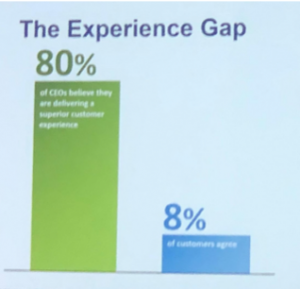
Simon introduced ‘The Experience Gap’ – the idea that on average 80% of companies think they deliver, whereas only 8% of customers agree!
This experience gap is often due to a lack of awareness and a company’s ability to identify and close those gaps will determine their success. The trend shows that buyers are choosing a great experience, rather than choosing based on just product specifications or cost.

Consider Starbucks – a great example of the experience economy:
It is helpful to consider O and X data (historical Operational data and eXperience data) and where we all stand. It’s the X data that tells you the “why” behind the “what”, analysing emotions and feelings. Typically companies are O data rich – almost drowning in it – but X data poor – and that is dangerous in the experience economy we are now in.: Addressing how to build X data, the session looked at i) collecting (e.g. Grundfos), ii) analysing (Tetra Pak) and iii) acting (operationalise insights (virgin media).
Simon added that in January “we hit the fast forward button” with SAP joining together more closely with its Qualtrics acquisition – the world’s largest O data company.
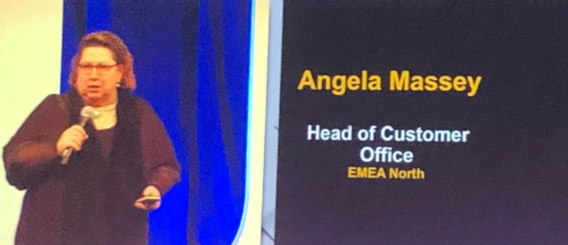
Andrea Massey, Head of SAP Customer office, EMEA North, covered what the Customer Office does and stressed SAP’s real commitment to customer Success through Customer First – a SAP corporate philosophy that puts the customer at the centre. This is driven by Accountability (via success executives), Orchestration (via engagement executives) and Measurement (via customer first methodology).
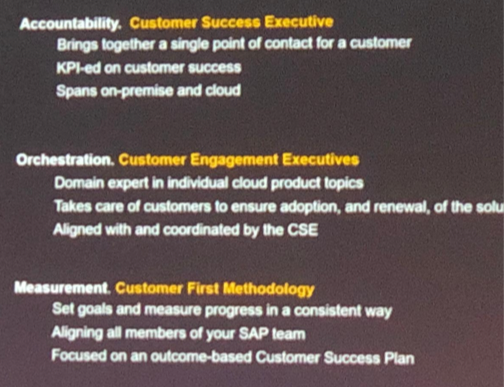
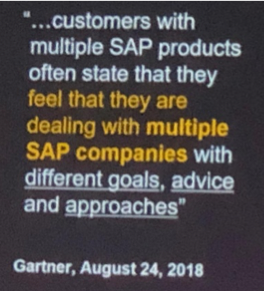
It was acknowledged that customers find dealing with SAP feels like dealing with separate companies and so SAP will be using customer success executives – individuals tasked with joining everything together.
This resonated with the earlier introduction and “Your success is our success” – engaging minds, empowering success.
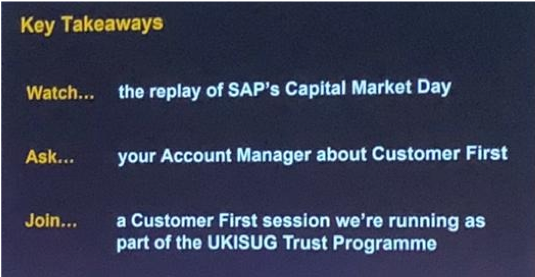
And now off to SUGFEST – more tomorrow!



